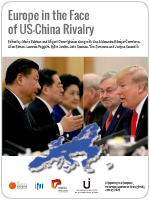The fifth edition of the ETNC report shows how US unilateralism and Chinese assertiveness have triggered a rethinking of the EU’s strategic landscape. Despite the differences between EU member states, its key finding is that all the countries analysed are in a similar position. They all consider the US their most important ally and they all depend on its military protection, but they also want to do as much business with China as possible.
The report contains 18 country chapters, all from EU member states, and a further one focused on the EU’s perspective on Europe’s difficult balancing act between the US, a long-term strategic and economic partner, and China, the EU’s second most important market and, probably, the next economic superpower. States like Portugal, Greece and Italy, due to their history and geographical location, are keen to present themselves as a bridge between the US and China. Some, like Finland and Hungary, are trying to play the two powers against each in other to extract possible concessions. Others, like Latvia, Romania and Slovakia, prefer to avoid trouble by maintaining a low profile, in wait-and-see mode. Finally, there is a group led by France, Germany and Spain that is working with Brussels to enhance the EU’s strategic autonomy and economic sovereignty.
This year’s edition has been led by the Elcano Royal Institute, with editorial review provided from Ifri, MERICS, the Polish Institute of International Affairs (PISM), The Royal Institute of International Affairs (Chatham House), The Swedish Institute of International Affairs (UI) and the Latvian Institute of International Affairs (LIIA), with active participation from all ETNC members.
See also:
- Political values in Europe-China relations. ETNC, December 2018.
- Chinese Investment in Europe: A Country-Level Approach. ETNC, December 2017.


